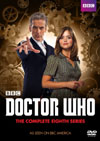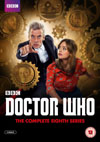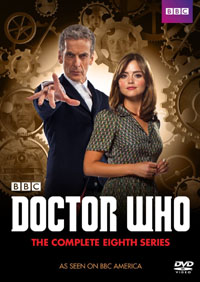DVD Extras for this story include:
Curiously, this story contains a lot of speeches that are so charismatically written that most of them will seem to be imparting great pieces of wisdom. This could be dangerous though, partly because they are actually very nicely suited to the perspectives and blind spots of each of the various characters they are given to... While this is good in terms of character writing, the danger is that more unsophisticated members of the audience may drink in too many of the false wisdoms presented. The other reason this is dangerous is because "Fear" is once more put on too high a pedestal. Capaldi makes a big speech to young Rupert at one point, basically expounding on the benefits of an adrenaline high. What's vitally missing here is the downside of adrenaline - that too much of it can damage the immune system and deplete a person's long term health. The adrenaline brought on by fear is designed for short-term gain in an emergency at the expense of long-term considerations. For optimum health, a person should spend the barest minimum of time possible in the state of fear. This brings me to my biggest beef concerning what people believe the core of this show is. Yes, it can deal with the conquering of fears and rightly so, but if we begin to believe that no matter how well we've conquered a fear in one scene or one episode, that we'll be back to focus on fears again in the next scene and the next episode, and the one after that, and the one after that, the victories rapidly become empty and hollow. Ultimately, the focus needs to improve and move on to other things, to prove that we actually have conquered something. This is partly why I find that the hypnosis that the Hinchcliffe era often exercises on fandom is something that should be resisted, and why the variety that Terrance Dicks advocated during his era, or the avenues of astronomy and legend and humour that Graham Williams aimed for are worth pursuing more vigorously. I'll give the director a point for making the under-the-bed-and-blanket sequences more effective and creepy than I might have imagined them to be, but ultimately I'm kind of bored by the fact that we went to those concepts in the first place, after having given them a good enough outing already with "The Girl in the Fireplace" (story no. 175). If something that big is going to share the bedroom with the characters, I think they deserve to pull the blanket off and have a good look at it, and the characters feel false for not finding a convincing reason to avoid pursuing that tactic. Even if the Doctor's on some tack about respecting an unknown creature's rights, respect goes both ways, and the sanctity of a kid's bedroom has a higher priority over any other sentiment this episode manages to express.
Also, the relationship between Clara and Danny is developed in very entertaining fashion - even though it was never a concept that I was truly invested in emotionally and could have happily dropped at any moment, at no point does it become dull. In writing scene for scene, the characters and the audience have to stay on their toes to keep it all sorted, while Jenna Coleman and Samuel Anderson do excellent work keeping up the empathy between the audience and their characters such that we can't turn away because we remain ultimately curious about what will happen next - in many cases what complication they will suffer next. One point perhaps isn't as clear during the episode as it is afterwards on reflection of how the whole thing works out: Clara really does take over as the hero and lead protagonist of this story. Even though we get every reason to believe Capaldi's Doctor may be on the cusp of a great external discovery and fully capable of leading us all safely through, it turns out that he's actually a bit of a nutcase that needs to be carefully handled. The entire problem is centered in his own multi-layered persona, and he makes the huge mistake of missing that and blaming external factors instead. Perhaps largely because he doesn't seem to really acknowledge or come to terms with this at the end of the story, I think this really isn't a great showcase for Capaldi as a great Doctor. This is a contributing factor helping to make the sequence that concludes the main story feel more like the middle of a tale than the end. Plus, that sequence has a speech that is trying hard to be far more wise and profound than it actually is... It has good bits in it, but it also winds up re-cycling a bit too much continuing formulaic rubbish, no doubt to facilitate more fear-based episodes of Doctor Who. Ho hum. But even if that keeps "Listen" down a number of pegs from my favourite story of the season, for the sake of variety and for staying true to the unusual concepts brought up in the rest of the story, this seemingly non-formula ending is a very good way to go in this case.
International Titles:Deutsch: "Hör zu"Magyar: "Figyelj"Français: "Jamais seul"Русский: "Слушай"Italiano: "Ascolta"Most languages seem to have interpreted the English as an imperative verb, and offered a command in the 2nd person familiar singular. The Hungarian verb actually describes a different action here with the title "Pay Attention" / "Watch". Meanwhile, the French went for a much larger departure with "Never Alone".
This story is available on DVD and Blu-ray:
Comments on this article are welcome. You may contact the author from this page:
|











